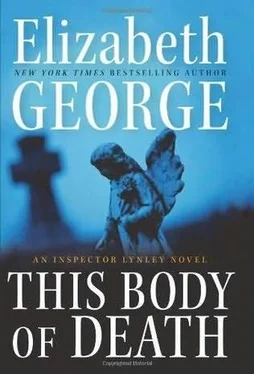“I see,” St. James said. “Well, if not the stone itself, what about the photo you showed me? It’s quite clear and you can see the scale. That might be all that’s necessary.”
“For the British Museum, possibly. But certainly not for Christie’s.”
St. James was silent for a moment before he said, “I wish I could be more help, Tommy. But I’m loath to send you in the wrong direction.”
“Nothing to apologise for,” Lynley told his friend. “It might mean nothing anyway.”
“But you don’t think so.”
“I don’t. On the other hand, I may be merely clutching at a straw.”
So it definitely seemed, because right, left, and centre everything was either utterly confusing matters or checking out as inconsequential. There was no middle ground between the extremes.
The background checks completed so far served as evidence of this: Of the principals in London involved in the case, tangentially or otherwise, everyone was turning out to be exactly who he seemed to be and nobody’s copy book was blotted. There was still the matter of Abbott Langer’s supposed marriages to be sorted, and Matt Jones-paramour of St. James’s sister-continued to be a question mark as there were more than four hundred Matthew Joneses spread out in the UK, so tracking each down and sorting them all out was proving a problem. Other than that, no one had so much as a parking ticket. This made things look grim as far as Yukio Matsumoto was concerned, despite his brother’s protestations of the violinist’s harmless nature. For with everyone else turning up clean and no one else in London apparently having a motive to murder Jemima Hastings, the killing either had to have been committed in the sort of act of madness one could easily associate with Yukio Matsumoto and his angels or it had to have arisen from something and someone connected to Hampshire.
Of the Hampshire principals, there were two curious points that had been uncovered and only one of them seemed likely to lead anywhere. The first point was that Gina Dickens had so far been untraceable in Hampshire although various forms of her name were still being tried: Regina, Jean, Virginia, etc. The second-and more interesting piece of information-was about Robert Hastings, who, as things turned out, had trained to be a blacksmith prior to taking over his father’s position as agister. And this might have merely been shoved aside as another useless bit of data had forensics not given a preliminary assessment about the murder weapon. According to microscopic examination, the thing was hand forged, and the blood upon it had come from Jemima Hastings, as well. When this information was added to Yukio Matsumoto’s possession of the spike, to the eyewitness report of an Oriental man stumbling from Abney Park Cemetery, to the e-fit generated by that report, and to what was likely to be blood residue on the violinist’s clothing and his shoes, it was difficult to disagree with Isabelle Ardery’s conclusion that they had their man.
But Lynley liked to have everything accounted for. Thus he returned to the stone that Jemima Hastings had carried in her pocket. It wasn’t that he assumed it was valuable and, possibly, the reason for her death. It was just that the stone remained a detail that he wanted to understand.
He was once again studying the photo of the stone when he received a phone call from Barbara Havers. She’d had the word to return to London, she told him, but before she did so she wanted to know if he’d unearthed anything about Chief Superintendent Zachary Whiting. Or, for that matter, about Ringo Heath, because it could be that there was a connection between those two that wanted exploring.
What he’d discovered was little enough, Lynley told her. All of Whiting’s training as a police officer had followed the usual, legitimate pattern: He’d done his required training weeks at a Centrex centre, he’d taken additional instruction at several area training units, and he’d attended an admirable number of courses in Bramshill. He had twenty-three years of service under his belt, all of them spent in Hampshire. If he was involved in anything untoward, Lynley hadn’t sorted what it was. He can be a bit of a bully on occasion had been the nastiest comment anyone cared to make about the bloke, although He’s been sometimes too enthusiastic about the job in hand could, Lynley knew, have several interpretations.
As for Ringo Heath, there was nothing. Especially there was no connection of record between Heath and Chief Superintendent Whiting. As to a connection between Whiting and Gordon Jossie, whatever it was, it was going to have to come out of Jossie’s background because it certainly wasn’t coming out of Whiting’s.
“So it’s sod bloody all on a biscuit, eh?” was how Havers received the information. “I s’pose her order to come home makes sense.”
“You’re on your way, aren’t you?” Lynley asked her.
“With Winston at the wheel? What d’you think?”
Which meant that Nkata who, unlike Havers, had a history of taking orders seriously, was returning them to London. Had she been given her way in matters, Barbara would have probably dallied until she was satisfied by what she was able to gather about everyone in Hampshire even remotely connected to Jemima Hastings’ death.
He concluded his call as Isabelle Ardery returned from her meeting with Hillier and Stephenson Deacon. She looked no more harried than usual, so he concluded the meeting had gone marginally well. Then John Stewart fielded a phone call from SO7 that put a full stop to the case as far as Ardery was concerned. They had the analysis of the two hairs found on the body of Jemima Hastings, he told them.
“Well, thank God for that,” Ardery declared. “What’ve we got?”
“Oriental,” he told her.
“Hallelujah.”
It would have been a moment for packing everything in then, and Lynley could see that Ardery was inclined to do so. But Dorothea Harriman came into the room in the very next moment and, with her words, burst everything wide open.
One Bella McHaggis was downstairs in reception, Harriman told them, and she wanted to speak to Barbara Havers.
“She was told the detective sergeant is in Hampshire, so she’s asked to see whoever’s in charge of the case,” Harriman said. “She’s got evidence, she says, and she doesn’t mean to hand it over to just anyone.”
BELLA WAS NO longer suspicious of Paolo di Fazio. That was finished the moment she’d seen the error in her thinking. She didn’t regret setting the coppers after him since she watched enough police dramas on the telly to know that everyone had to be eliminated as suspects in order to find the guilty party and, like it or not, he was a suspect. So was she, she supposed. Anyway, she reckoned he’d get over whatever offence he might be feeling because of her suspicions and if he didn’t, he’d find other lodgings, but in any case she couldn’t be bothered because Jemima’s handbag had to be turned over to the officers investigating the case.
As she didn’t intend waiting at home for them finally to show their faces this time round, she didn’t bother with the phone. Instead, she’d dropped Jemima’s handbag into the canvas carryall that she used for her grocery shopping, and she’d carted it off to New Scotland Yard because that was where that Sergeant Havers person had come from.
When she learned that Sergeant Havers wasn’t in, she’d demanded someone else. The head, the chief, the whoever’s-in-charge, she said to the uniform in reception. And she wasn’t leaving till she talked to that person. In person, by the way. Not on the phone. She parked herself near the eternal flame and there she determined to remain.
And damn, if she didn’t have to wait exactly forty-three minutes for a responsible party finally to appear. Even when this happened, she didn’t think she was looking at the responsible party at all. A tall, nice-looking man approached her and, when he spoke from beneath his head of beautifully groomed blond hair, he didn’t sound like anyone she’d ever heard yapping away on The Bill. He was Inspector Lynley, he said in the plummy tone that had always proclaimed Public School in One’s Past. Did she have something related to the investigation?
Читать дальше












